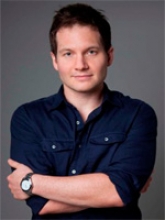
Nine graduate students in the University of Iowa’s acclaimed Nonfiction Writing Program have published We Might As Well Call It the Lyric Essay, an anthology that celebrates and analyzes the small but popular literary form of the lyric essay.
Published by Hobart College Press, the book is the product of a year-long course that the students took with Professor John D’Agata, Director of the Nonfiction Writing Program within the College of Liberal Arts & Sciences and the author About A Mountain, named by the New York Times as one of the “100 Best Nonfiction Books Ever Written.”
D’Agata has long served as the editor of lyric essays for the journal Seneca Review, which is also published by Hobart College. To celebrate his fifteenth year as one of the magazine’s editors, Seneca asked D’Agata to compile a list of his favorite essays from the journal.
“I wanted to do more than a list, though,” says D’Agata. “I’m always trying to find ways to give my students real-world experiences. So I asked Seneca if they’d let my students help me come up with the list, and then I asked if they’d go one step further and actually publish our results. And to my delight they said yes. That changed the course dramatically, because knowing that your classroom discussions are going to end up as a book raises the level of those discussions instantly.”
We Might As Well Call It the Lyric Essay features essays by such literary stars as Anne Carson, Wayne Koestenbaum, Mary Ruefle, and Joe Wenderoth, each of which is paired by a critical essay written by the graduate students, as well as interviews that the students conducted with the authors.
“I never thought I’d have this kind of experience in graduate school,” says Joshua Wheeler, one of the book’s co-editors and a student in the Nonfiction Writing Program. “The course gave me hands-on experience as an editor, the chance to personally interact with some of my favorite contemporary writers around the country, and then the opportunity to define, in a really consequential way, an entire literary form.”
The lyric essay was first published by Seneca Review in its fall 1997 issue, at which time the magazine called the form “a fascinating sub-genre that straddles the essay and the poem,” according to an introduction by former editor Deborah Tall. “These ‘poetic essays’ or ‘essayistic poems’ give primacy to artfulness over the conveying of information. They forsake narrative line, discursive logic, and the art of persuasion in favor of idiosyncratic meditation.”
Barret Baumgart, a 2014 graduate of the Nonfiction Writing Program and another editor of the book, wrote about the author Mary Ruefle for We Might As Well Call It the Lyric Essay. “It was brilliant to look closely at essays that I respected and loved, and to write critically about what I liked,” said Baumgart, whose own writing has been widely published in numerous literary journals. “Seneca Review is mainly responsible for establishing the lyric essay as a genre, and I was awesome to be so involved in the editorial process alongside someone like John.”
“Iowa is where I learned how to write,” says D’Agata, who himself is a graduate of the Nonfiction Writing Program. “It’s where I was encouraged for the first time to imagine a place for myself in the literary world. That’s a tremendous gift to receive as a young writer, and it’s a gift that I now want to make sure I’m passing on to my own students. It’s an empowering thing to be told that you have a voice. That was the point of this course.”
“Looking at the project now, in its finished form, it seems a project of astounding optimism,” says Gemma de Choisy, a graduate student in the Nonfiction Writing Program, who also worked on the book. “We set out to define the lyric essay, and I think we broke it instead—but in the most exhilarating and inspiring ways. It’s a wonderful thing to see the long-standing boundaries of literary conventions teeter, if not actually fall. It gives me hope.”
D’Agata and his students will present a reading from We Might As Well Call It the Lyric Essay on Monday, November 10 at 8:00 pm at Prairie Lights Books in downtown Iowa City.